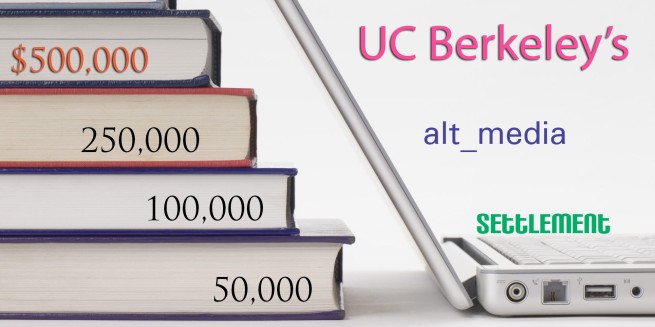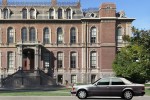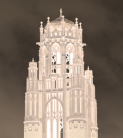 I work for one of the poorest universities in California. We have little in way of endowment or research funding. Our campus is small and utilitarian. Our AT program is poorly funded and experiences continued resentment by administration and staff. We have no advocacy student group and nearly no support from faculty. No champions here. In the past we had a director who funded off campus training and conferences, but now those funds may dry up, as the civil rights steam has let out from an apathetic (pathetic) populace.
I work for one of the poorest universities in California. We have little in way of endowment or research funding. Our campus is small and utilitarian. Our AT program is poorly funded and experiences continued resentment by administration and staff. We have no advocacy student group and nearly no support from faculty. No champions here. In the past we had a director who funded off campus training and conferences, but now those funds may dry up, as the civil rights steam has let out from an apathetic (pathetic) populace.
In what may be my last appearance at a conference for a while, I was able to sit in on a session featuring the results of an Initiative at UC Berkeley – this at CSUN in San Diego. The Berkeley’s desire to comply with just an initiative and not a full-blown OCR or civil legal settlement is magnificent and contrasts starkly against my school’s OCR for failure to provide alternative formats in a timely manner a few years ago. I’m not ashamed. I warned the administration here and the turned a deaf ear. They only accused me of loosing the dogs on them, and thereafter cut any conference funding I requested as punishment.
Platinum schools, first-level, high-tiered educational institutions like Berkeley and Stanford are leaders in providing students with accessibility. Our claim to fame would have to be in having a long-standing resistance movement against the principalities and forces of justice standing atop the Rehabilitation Act, the ADA and any other laws that have to do with access to education for the disabled. The irony, acrid in my mouth, is that we are a leading teacher’s college and have a well-known rehabilitation program training leaders in education to know about those very laws, while our university has consistently and deliberately ignored them.
Back to the “shocking” UC Berkeley results, which are to be the model for educational institutions in the United States: The presenter who apparently was the lead alt media specialist at the school, reports that they now have like 7 full-time workers creating thousands of pieces of alt media a term. Like this is the model??? Model for what? the affluent? Can you be real! Seven staff, endless resources for producing work, for how many students? Who many blind students are you servicing? I think my campus alone has more blind students than the entire UC system does.
Being that I’m at a school that has one alt media staffer, and a mere 3 part time student workers making around 125 new books and possible another 200 short materials, on taped wings, and no funding set for another year of Kurzweil  3000 secure, we aren’t comparing apples to oranges; more like BMW to Kia, Mercedes to Hyundai. The caliber of the students between our schools may also be represented by this comparison. The UC Berkeley have’s have don’t competitively compare with the Cal State have knots, who try to untie themselves from their foundations of uneducated parents and low social economic standing – America for my students is and inherently competitive and unfair society. But the end result is also fundamentally equally adrift. The have’s get better jobs, send their kids to have schools, while the have knot’s struggle to keep their kids out of gangs let alone pay for their kids to go to any college.
3000 secure, we aren’t comparing apples to oranges; more like BMW to Kia, Mercedes to Hyundai. The caliber of the students between our schools may also be represented by this comparison. The UC Berkeley have’s have don’t competitively compare with the Cal State have knots, who try to untie themselves from their foundations of uneducated parents and low social economic standing – America for my students is and inherently competitive and unfair society. But the end result is also fundamentally equally adrift. The have’s get better jobs, send their kids to have schools, while the have knot’s struggle to keep their kids out of gangs let alone pay for their kids to go to any college.
So sincerely what lessons can you really learn from the “landmark settlement?” None that I can think of. The absurdly overdone effort to better their students only makes all the other schools in the country pale. I can only say, “good for them.” But to the DRA who promoted this joke, I say, you really messed up. You should have investigated a small school funded by the government who still refuses to acknowledge federal and state law. What about Dominguez Hills for God’s sake? Just look at the disability enrollment figures of the poorer schools and you can immediately tell which ones the common disabled student knows not to attend. But, what you’ve done, DRA, is to build  an accessible ivory tower above the clouds and the common man, when only a trickle of disabled people ever attend your campus (and the rest of the UCs). The 3rd rate and second rate schools whose administrations hide their low class services to the disabled behind vulgar lying policies and procedures but who in effect provide poor services, you never even set foot on their campuses. The truly oppressed have no voice and are not heard, a far cry from Berkeley’s polished elite students who know who to be heard.
an accessible ivory tower above the clouds and the common man, when only a trickle of disabled people ever attend your campus (and the rest of the UCs). The 3rd rate and second rate schools whose administrations hide their low class services to the disabled behind vulgar lying policies and procedures but who in effect provide poor services, you never even set foot on their campuses. The truly oppressed have no voice and are not heard, a far cry from Berkeley’s polished elite students who know who to be heard.
Tell me how is the model supposed to proliferate to other campuses nationally. Who is going to look at it and not say, “this is ridiculous, so glad they didn’t evaluate our program.” Many providers already say that about section 508. They say things like “Caption all the video content, absurd!” They said the same thing about the implementation of the Rehabilitation Act and the ADA years past.
No this settlement is in fact the DRA’s piece of publicity for itself, and really will have no impact on the other 4,000 or so schools nationwide still barely keeping up with their student’s needs. It only benefits a couple students at Berkley, but the rest of the country’s disabled are still unable to take STEM courses using Braille, have captioned videos in the classroom, and at some schools even having adequate access to computers on campus except for a couple designated workstations segregating them from the rest of the campus computing resources. Almost no college in California, except the Elite Stanford and Berkley can handle a blind student majoring in STEM. Who can afford it too? or has everything neatly in place?
Quote from the DRA website:
Nationwide, college students with print disabilities – individuals who cannot read standard print because of vision, physical, developmental, or learning disabilities – face major barriers and disparities to academic success because colleges and universities fail to provide these students with text books, course readers, and library research materials in alternative formats they can read. These formats include Braille, large print, audio, and digital text that is compatible with various types of assistive technology software.
To address this critical issue, DRA worked with the University of California, Berkeley for one year in a collaborative structured negotiations process that resulted in a new set of policies and practices to ensure that print disabled students have access to all of the written instructional materials needed to succeed in a university setting.


0 Responses to “A Poor Settlement at UC Berkeley?”